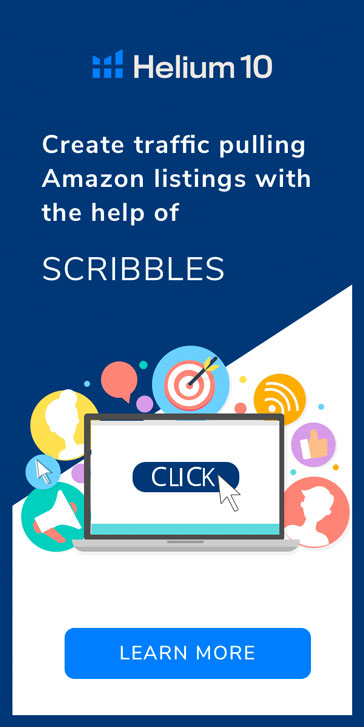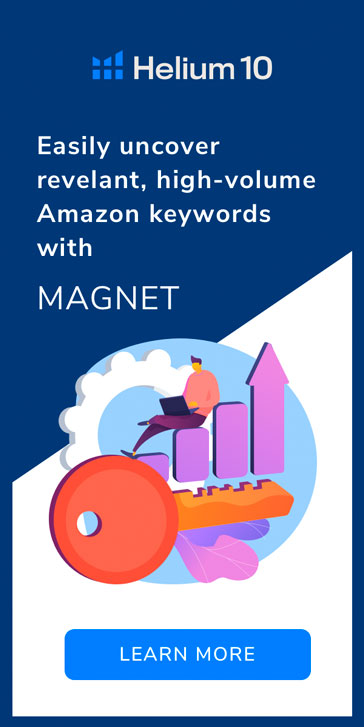Just how important is it for sellers to gather relevant Amazon search data?
These days, big software companies are valued by the quality and amount of data they collect and use. While data through cloud computing, machine learning, and customer use can be misused (*cough* Mr. Zuckerberg *cough*) it also allows these companies to provide an incredible amount of valuable data to their users.
This is especially true for Amazon sellers when it comes to keyword tools. Almost no keyword tools will tell you where their Amazon search data is coming from, and each platform seems to pump out different numbers for search volume—so who’s telling the truth?
Who’s making up BS keyword search volume estimates with basic algorithms and then passing it along to you as if it were fact?
Why Keyword Search Volume Accuracy is Important
An Amazon keyword tool is like your compass for ranking on Amazon. If you don’t know which keywords people are searching for on Amazon, you can’t strategize on how to rank for those keywords.
If you’re optimizing your product listing for a certain keyword phrase (putting it in your title, running a launch campaign that targets it, Amazon PPC campaign, etc), but no one is actually searching for that phrase, then no one will see your listing!
This kind of situation would be like using a broken compass to navigate across the Atlantic Ocean. Bob the compass guy assures you it’s accurate even though it seems shoddy. But you don’t know how to verify that the compass works, so you’ll just have to trust him. Ok, time to drop anchor and head off to sea! Seems crazy right?
The Difference Between Amazon Search Data & Other Search Engines
Amazon has secured itself as the go-to search engine for physical products online and now has more than 50% of all searches for products on the web (the rest includes Google, Bing, etc).
Unlike Google, people typically go to Amazon for one reason—to buy stuff!
On Google, the search queries range from “what’s the circumference of the globe?” to “monkey throwing poop video.” It could be a question, a specific video, resource, or product—anything really.
Because the searches are for such broad reasons, Google search data should be treated very differently from Amazon search data. It’s not safe to assume that entering search terms like “wooden spatula” in Google means that a person wants to buy a wooden spatula; maybe they want a DIY make-your-own spatula video. Maybe they just want to look at pictures of wooden spatulas, or maybe they just want to know if they are safe for cooking at high temperatures.
If someone enters “wooden spatula” on Amazon, you can be reasonably sure they want to buy a wooden spatula because that’s all Amazon will provide for them in the search results. Amazon is the place to buy; Google is the place to find anything and everything–very different data.
How Keywords and Search Terms Affect Amazon Sellers
Many of the Amazon keyword tools out there use Google, Bing, or other search engine data to give you search volume estimates of Amazon keywords. You should see by now why this is a problem. The only data that matters is what real Amazon shoppers are searching for short and long tail keywords and buying through those keyword phrases. Period.
Almost none of the tools publicly share how they collect the data their tools use, and some of them even openly share they use Google data. In fact, the first version of Magnet by Helium 10 used to do this, but they were transparent about it from the beginning. Magnet 2.0 now ONLY creates highly accurate estimations using Amazon trends and other factors as a guide.
The consequences of using bad data can be catastrophic for Amazon sellers, i.e. affecting sales and your conversion rate. Imagine you paid a copywriter $300 to write you a listing targeting bad keywords, then you paid a launch service to give away 100 units at 90% off during your launch promotion. You paid the launch service $300 and gave away $800 worth of product.
Once shipping and FBA fees are accounted for, you’re out about $1700 and you successfully ranked on page one for a search phrase that actually only had 25% of the search volume your keyword tool told you it did. You’ve just wasted $1700, yay!
How to Identify Inaccurate Amazon Search Data
Luckily there are a few tricks that can easily identify inaccurate data, you just have to keep a sharp eye out for them. Any time you come across search results that don’t fit the product, a red flag should go up and a serious question mark should arise about the quality of that tool.
Phrases That People Wouldn’t Logically Search for On Amazon
Examples of these would be “DIY pest repellent,” “how to repel pests” or “pest control service.” These are searches people would more likely make on Google. It doesn’t make sense to search for them on Amazon because it will only show them products to buy, and these phrases are highly unlikely to be for a product.
If your keyword tool is giving you results like this, you can almost certainly say it’s using Google or Bing data to show you Amazon search volume estimates.
Tool Data is Too Different from Your Own Data
Take a product that you’ve been selling for a while and have a decent amount of Sponsored Products PPC data for Amazon ads. Based on this data, you should have a good idea of what keywords sell the most and drive the most Amazon sales.
Compare that with what the tool is telling you. Are they telling you something completely different? Is their top volume keyword a total dud according to your data? Remember that performing reverse ASIN searches on products from your competitors can also reveal much in the way of effective keywords.
Tool Shows the Same Data Months Later
There are some super popular keyword tools out there that don’t update their data on what I’d consider being an acceptable basis.
I’m not going to name any names, but I used one of the most popular tools and I compared keyword data for the same keyword but one year later — it was the same exact data.
What are the chances the actual search volume hasn’t changed by a single digit over the course of a year? I’m no mathematician, but my bet here is on inaccurate data.
In Conclusion
The moral of the story is to be careful what tools you use for your brand growth and advertising strategy. Also be wary of what data estimations you trust to make your business decisions. The money saved by using a cheap keyword tool can easily be outweighed by the damage its results can cause you.
Look for transparency. If a tool can neither confirm nor deny they use Google data, assume it’s Google data. Helium 10 has always been transparent about their data estimates.
For this reason, two years later I still trust their tools to make decisions in my own business, and I’d recommend using this same mindset when evaluating new tools for yourself.
Original post from How Crucial is Amazon Search Data for Acquiring Better Keywords? – Helium 10





























